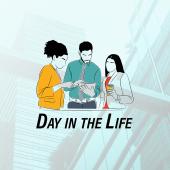Each year over 100 in-house counsel from around Australia participate in the ACC Australia Mentoring Program. Past participants Chaman Sidhu and Alexandra Smith share their experience and provide insights on how to successful build a mentoring relationship.
Chaman Sidhu
Sidhu is legal director and company secretary at Envato Pty Ltd. From Melbourne headquarters, Envato runs global websites for the creative professional community, such as e-commerce marketplaces for digital items and freelance services, and online learning courses. Sidhu was previously general counsel and company secretary at Lonely Planet Publications after being in private practice in Australia and the United States.
From the Mentor
Heading into my fourth year of mentoring in the ACC Australia program, I’ve become a keen supporter of this initiative. When I moved to a greenfields GC role in 2001, I successfully drew support from peers and advisors in the profession, but a having a seasoned in-house mentor would also have been beneficial. Thank you to ACC Australia members past and present, and program managers, who’ve instituted and maintained this program. I commend the mentoring experience to others – mentoring is equally rewarding for mentors as it is for mentees, and requires a very reasonable and manageable time commitment.
There are so many smart and talented people in the in-house legal profession, and Alexandra is no exception. It’s a privilege to play a small part in helping someone to grow when they already have so much to offer. My experience in mentoring Alexandra and others is that there is a remarkable commonality of experience in the in-house role even if there are differences in technical specialisation, industry, company size or company culture. We all ultimately need to build and navigate relationships throughout the business, deeply understand business context and strategy, and prove our personal value-add as well as that of the legal function — all whilst providing a demanding professional service. Mentors can often be further along the learning curve, having moved through the learning stages for a particular area from ‘unconscious lack of competence’, through ‘conscious lack of competence’ and ‘conscious competence’ to ‘unconscious competence’ (where one is skilled in an area without having to think about it, like driving a car without needing to focus on how it’s done). It is immensely rewarding to help someone else enjoy that journey and find their own style along the way.
Unsurprisingly, a mentor-mentee relationship can quickly move on from discussion of technical skills (which remains a useful focus, particularly for younger lawyers). Alexandra was very thoughtful about articulating her aims for our mentoring relationship, beyond building technical skills in the IT contracting arena. We quickly settled into informal and free-flowing discussions, but these were centred on three clear goals. Goals can naturally adjust or take on a different focus as the year unfolds.
A successful relationship of this type is centred on two things — trust and a mutual attitude of openness and learning. It should not be a one-way relationship. I have found that the process of articulating my own experiences and encouraging someone else in their career goals is invigorating for my own professional growth. I leave each meeting refreshed, and thinking more broadly and energetically.
My take-aways for mentors are:
- Settle on your own style that’s right for you and your mentee, but keep their goals in mind.
- Coach and even challenge your mentee, and encourage them towards concrete action.
- Enjoy yourself. It’s a great way to reflect on your own learnings. Do you practise what you preach?
Some suggestions for mentees:
- Have thoughtful objectives, let them flex, but return to them.
- Do your bit between meetings. Review, reflect and then action.
- Pay it forward! You may be ready to mentor others, like those new to in-house.
Alexandra Smith
Smith is a senior commercial lawyer at AusNet Services, providing advice on many areas of law, with a key focus on corporate and commercial advice, litigation and dispute resolution and information technology. Prior to joining AusNet Services, Smith was a senior associate in private practice, with over five years’ at Minter Ellison Lawyers in Adelaide and two years working in Jersey in the Channel Islands. Smith completed a Bachelor of Laws and Legal Practice and Bachelor of Arts at Flinders University of South Australia.
From the Mentee
I was first interested in the ACC Australia mentoring program when I joined ACLA (now ACC Australia) in 2012, but the program was full and I was not able to secure a place. It was then that I realised I could be onto something. I made sure in the following year to sign up as soon as the request for interest went around.
It is not often you get access to people at the height of their career who are willing and able to assist you in your career development. It’s something many people are willing to pay for.
I was matched with Chaman Sidhu at a time when I was being asked to work on an increasing amount of information technology contracts and negotiations, and I placed on a large technology remediation project that was going to run for a number of months. It seemed like perfect timing. Chaman and I arranged to meet for monthly breakfasts due to our respective busy schedules.
Even with the best internal relationships in the workplace, sensitive issues arise, and these are best discussed in a confidential setting outside the workplace, with someone you can trust. I had reached a stage in my development where I needed to learn to demonstrate the value of my work and capabilities to senior stakeholders in the business, and was in need of some guidance around better ways to handle difficult situations. Being able to discuss these situations with a trustworthy and confidential mentor is one of the most valuable development tools a lawyer (or any professional) can have.
I received honest and constructive feedback from Chaman, who I found had been through almost everything I was facing before.
Some of the key take-aways from my time in the mentoring program are:
- It’s not always a good idea to say what you think. Be measured in your response to situations and try and take a step back.
- Think of new ways to push yourself to handle situations you might otherwise be tempted to avoid.
- Don’t be quick to make a judgment about a situation. There could be a range of reasons why a situation has presented itself and you shouldn’t assume it has anything to do with you.
The ACC Australia mentoring program gave me an opportunity to connect with someone that I otherwise may never have had the opportunity to meet, who happened to have a wealth of experience in the area of law I had been thrust into.




